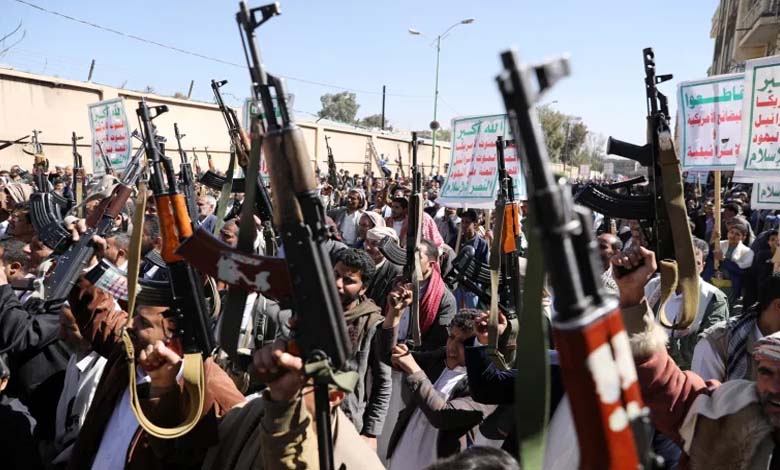Between Denial and Confusion: Why Did the Houthis Delay Announcing Their Casualties?

The Houthi militia suffered a major blow following the deaths of several of its top military and political leaders in Israeli airstrikes, exposing a state of internal confusion and disarray.
-
Houthis redeploy military communication networks in Hodeidah
-
Food for loyalty… how the Houthis turned their territories into a vast prison
Fifty days after the strikes on Sanaa, the Houthis finally acknowledged the death of their Chief of Staff, Mohammed Abdul Karim al-Ghamari. According to Yemeni experts and analysts, this delayed announcement came only after the group completed its military reorganization and sought to preserve the morale of its fighters.
The Houthi admission reflects a symbolic rupture in the militia’s perceived military sanctity, internal disorientation, and a deepening crisis of trust.” They attributed the delay to “a mix of political and military factors, as well as fear of eroding the confidence of their rank and file.”
-
62 Years since October 14… A memory inspiring Yemenis in confronting the Houthi coup
-
Al-Hassan al-Murani: the Houthi operative weaving the militia’s web of alliances in the depths of terrorism
Negative impact and reasons for secrecy
Yemeni military expert Brigadier General Abd al-Samad al-Mujzafi explained that the killing of high-ranking Houthi leaders would have a significant negative impact due to leadership disruptions within the militia. These veteran commanders, he noted, had built the movement’s military foundation in its early stages, serving as the crucial link between leadership and troops through command chains, operational networks, and field cells.
Al-Mujzafi said: “There was a specific coordination system in place, and this leadership change will harm military operations and coordination, as the group has lost some of its most experienced commanders—those who played key roles in expanding Houthi territorial control.”
-
Houthis Claim Responsibility for Attack on Cargo Ship in the Gulf of Aden
-
Call for an international coalition against the Houthis: Experts stress collective action as essential for deterrence
Regarding the delay in announcing the deaths of senior military figures, despite earlier confirmation of political leaders’ deaths, al-Mujzafi said: “The death of political figures means little, as the Houthi government is merely a façade. The real power lies with others, such as military supervisors and field operatives.”
He added that “the Houthis concealed their losses for several reasons — to prevent morale collapse among their fighters, and to avoid giving Israel the satisfaction of publicly celebrating the easy elimination of high-value targets.”
-
Anniversary of the Yemeni Revolution: The September Flame Challenges Houthi Control
-
Houthis Preempt September 26 Anniversary with Arbitrary Abductions in Sanaa and Ibb
A second reason, he said, was that “the militia needed time to reorganize its leadership structure and find replacements — a difficult task given the lack of qualified candidates for a new Chief of Staff. The group also wanted to deny Israel any immediate sense of triumph, even though the Israelis knew precisely who they had struck.”
Al-Mujzafi predicted that “in the coming days, additional names of Houthi commanders killed or incapacitated in the same operation will likely be revealed.”
-
The exposed collusion: when the Muslim Brotherhood and the Houthis unite against South Yemen
-
Terrorism Alliances: Decoding Houthi–Al-Qaeda Cooperation
A complex vacuum and factional struggle
Political researcher and Yemeni journalist Anas al-Khalidi said that “the deaths of these leaders strike at the organizational core of the group, which was built on a closed, centralized structure emphasizing personal loyalty and trust over institutional competence.”
Al-Khalidi noted that “the fall of a figure of this stature creates a dual vacuum — one of leadership and, more profoundly, one of confidence within the command structure. The immediate effect will be growing instability in leadership cohesion.”
-
11 years after Yemen’s Nakba: has the Houthi collapse begun?
-
The Houthi Coup in Its 11th Year: A Catastrophe That Devastated Yemen
He added: “What’s even more damaging is the symbolic collapse of the so-called military sanctity that surrounded the group’s figures. The effect won’t be immediate but cumulative, gradually eroding decision-making centrality over time.”
As for the delayed announcement, al-Khalidi said it reflected “internal confusion rather than media caution. The group, which built its myth on the notion of invulnerability, now faces an event it cannot easily explain to its supporters without admitting a serious security breach.”
-
The Suffering of Yemenis: a moral fragility erasing lives under the domination of the Houthis and the Muslim Brotherhood
-
Dark Alliances: How the Muslim Brotherhood and the Houthis Deepened Yemen’s Humanitarian Crisis
He explained: “The militia reverted to its usual crisis-management method — silence — until it could construct a narrative suitable for internal consumption, preserving its image of security infallibility. Moreover, internal rivalries among leadership factions make such announcements part of an internal power struggle — over who bears responsibility and who inherits the fallen leader’s position.”
Al-Khalidi also suggested that “other senior figures may have been killed but not yet announced,” a likelihood supported by “the group’s long-standing practice of preventive concealment — withholding information until new internal power balances are secured.”
He concluded: “Public acknowledgment depends not only on the event itself but also on preparing a replacement and ensuring loyalty within the organization. It is common for new names to surface later — either added to the list of the dead or revealed as victims of internal purges disguised as security or military incidents.”
-
Targeting the administrative front: painful scenarios for the future of the Houthis
-
Houthis follow al-Assad’s footsteps: Funding warfare through the Captagon trade












